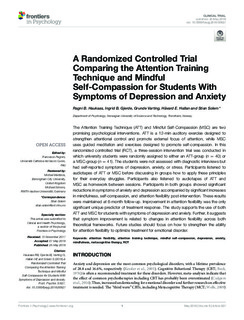| dc.contributor.author | Haukaas, Ragni B. | |
| dc.contributor.author | Gjerde, Ingrid B. | |
| dc.contributor.author | Varting, Grunde | |
| dc.contributor.author | Hallan, Håvard E. | |
| dc.contributor.author | Solem, Stian | |
| dc.date.accessioned | 2018-05-29T08:51:56Z | |
| dc.date.available | 2018-05-29T08:51:56Z | |
| dc.date.created | 2018-05-28T09:42:25Z | |
| dc.date.issued | 2018 | |
| dc.identifier.citation | Frontiers in Psychology 2018, | nb_NO |
| dc.identifier.issn | 1664-1078 | |
| dc.identifier.uri | http://hdl.handle.net/11250/2499517 | |
| dc.description.abstract | The Attention Training Technique (ATT) and Mindful Self-Compassion (MSC) are two promising psychological interventions. ATT is a 12-min auditory exercise designed to strengthen attentional control and promote external focus of attention, while MSC uses guided meditation and exercises designed to promote self-compassion. In this randomized controlled trial (RCT), a three-session intervention trial was conducted in which university students were randomly assigned to either an ATT-group (n = 40) or a MSC-group (n = 41). The students were not assessed with diagnostic interviews but had self-reported symptoms of depression, anxiety, or stress. Participants listened to audiotapes of ATT or MSC before discussing in groups how to apply these principles for their everyday struggles. Participants also listened to audiotapes of ATT and MSC as homework between sessions. Participants in both groups showed significant reductions in symptoms of anxiety and depression accompanied by significant increases in mindfulness, self-compassion, and attention flexibility post-intervention. These results were maintained at 6-month follow-up. Improvement in attention flexibility was the only significant unique predictor of treatment response. The study supports the use of both ATT and MSC for students with symptoms of depression and anxiety. Further, it suggests that symptom improvement is related to changes in attention flexibility across both theoretical frameworks. Future studies should focus on how to strengthen the ability for attention flexibility to optimize treatment for emotional disorder. | nb_NO |
| dc.language.iso | eng | nb_NO |
| dc.publisher | Frontiers Media | nb_NO |
| dc.rights | Navngivelse 4.0 Internasjonal | * |
| dc.rights.uri | http://creativecommons.org/licenses/by/4.0/deed.no | * |
| dc.title | A Randomized Controlled Trial Comparing the Attention Training Technique and Mindful Self-Compassion for Students With Symptoms of Depression and Anxiety | nb_NO |
| dc.title.alternative | A Randomized Controlled Trial Comparing the Attention Training Technique and Mindful Self-Compassion for Students With Symptoms of Depression and Anxiety | nb_NO |
| dc.type | Journal article | nb_NO |
| dc.type | Peer reviewed | nb_NO |
| dc.description.version | publishedVersion | nb_NO |
| dc.source.volume | 9 | nb_NO |
| dc.source.journal | Frontiers in Psychology | nb_NO |
| dc.identifier.doi | 10.3389/fpsyg.2018.00827 | |
| dc.identifier.cristin | 1587044 | |
| dc.description.localcode | Copyright © 2018 Haukaas, Gjerde, Varting, Hallan and Solem. This is an open-access article distributed under the terms of the Creative Commons Attribution License (CC BY). The use, distribution or reproduction in other forums is permitted, provided the original author(s) and the copyright owner are credited and that the original publication in this journal is cited, in accordance with accepted academic practice. No use, distribution or reproduction is permitted which does not comply with these terms. | nb_NO |
| cristin.unitcode | 194,67,40,0 | |
| cristin.unitname | Institutt for psykologi | |
| cristin.ispublished | true | |
| cristin.fulltext | original | |
| cristin.qualitycode | 2 | |

